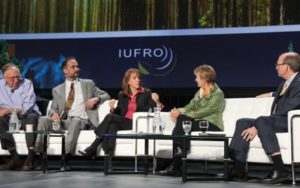Sally Collins participated in the XXIV IUFRO World Congress on “Sustaining Forests, Sustaining People: The Role of Research”
Plenary 3 Panel: Knowledge Discovery, Synthesis, and Application at the Forest Science/Management Interface

How can we effectively integrate the many ways of understanding forests to create the best paradigms to manage them?
That was the question that moderator Nalini Nadkami, professor of biology at the University of Utah, posed to a panel of five scientists and researchers during the second portion of the joint plenary with the Canadian Institute of Forestry and the Society of American Foresters.
According to panelist Sally Collins, who owns a consulting firm dedicated to international forestry and ecosystem services valuation, a good way to start is to slow down a bit and be more deliberate. “We are racing through urgent things all the time, but are missing much in the process,” she said. “We need to experience life.”
That, in turn, may lead to a better understanding of the world. “If we don’t know what we don’t know,” she said, “we will continue not to know it.”
Mike Wingfield, who is the founding director of the Forestry and Agricultural Biotechnology Institute in South Africa agreed, but to a point. “We do need to slow down and think,” he said, “but we have to deal with the real world.”
For Mila Alvarez, professor at Virginia Polytechnic Institute and State University, time also is important, but in a different way. “We take time as a constant variable,” she said. “It influences how we operate and manage natural resources.
“However, there are forest ecosystems that have been around for thousands of years. As managers we are cognizant of that timeframe, but society lives in the present. Who is thinking about 500 years from now? Our nature, our lives influence how we think about natural resources.”
According to Jack Dangermond, founder and president of ESRI, “we live in stimulus/response world and a contemplative/creative world. We are integrative in our own sense of being able to deal with the abstract world and the contemplative/ordinary world.”
The panel also discussed some of the obstacles that must be overcome in the interface between forest science and forest management.
“When we make policy, how much is in the name of science and how much in the name of politics?” said Alvarez.
She noted that time plays a role as well. “Perhaps we struggle because we live in a culture that is so focused on the moment. Our human scale prevails in the decisions we make and the way we operate. That has limited our ability to speak of the time of systems.”
Wingfield, noting his work in short-rotation forestry, said “managers want results quickly, but scientists work more slowly. Say an insect infests eucalyptus. Managers want answers now. Managers seek a silver bullet, snake oil, and they often fall back on solutions that won’t work.”
Citing her background as a manager for the U.S. Forest Service, Collins said, “How you take science and incorporate it into management is an art form. The best science in the world goes nowhere if you don’t have infrastructure to implement it and an adequate budget. The science culture and the management culture have to meet.”
According to Dangermond, “Science is driven by management to provide better understanding. Science should precede management action.”
Panelists favored clear communication to help bridge the gap between science and management.
“Storytelling itself allows us to integrate. You have to integrate multiple levels of your own being,” said David Haskell, professor of biology at the University of the South. “Mechanisms that encourage conversation and listening across big divides are good.”
Dangermond agreed. “The discipline of writing as a mechanism for integration is important,” he said. “Writing and mapping are abstract ways of bringing knowledge together.”
“Some people are skilled to speak and write, others are able to use images to provide an impact,” Alvarez said. “I try to create a connection between a piece of science and what we do. This exercise allows me to create mental connections. If you make connections, it will allow you to make contributions.”
“Most of my professional life has been focused on policy and management, and how to use information and transform it in ways people can use in their everyday lives,” said Alvarez. “Integrating concepts not directly related to one’s profession helps.”
The panel also discussed the place of ethics, especially as it relates to sharing, or not sharing, data, and even how those data are displayed.
“From a policy perspective there is fear that once you put something on a map, you are already sending a message,” said Alvarez. “There is a danger how you map information because the consequences have impacts on the environment and communities.”
“Given that knowledge is power, who has access to it?” Haskell said. “One hopeful side of the decentralization that technology allows is good – you can have access to tools via a cell phone, for example.”
Dangermond noted the current Ebola scare and the inability or unwillingness of governmental organizations to share the data they have collected. “We have to lift the world up to be able openly share the data effectively. The web has opened up a lot. The world is moving to a more open sharing of data.”
Written by: Pete Gomben for the IUFRO Blog
